
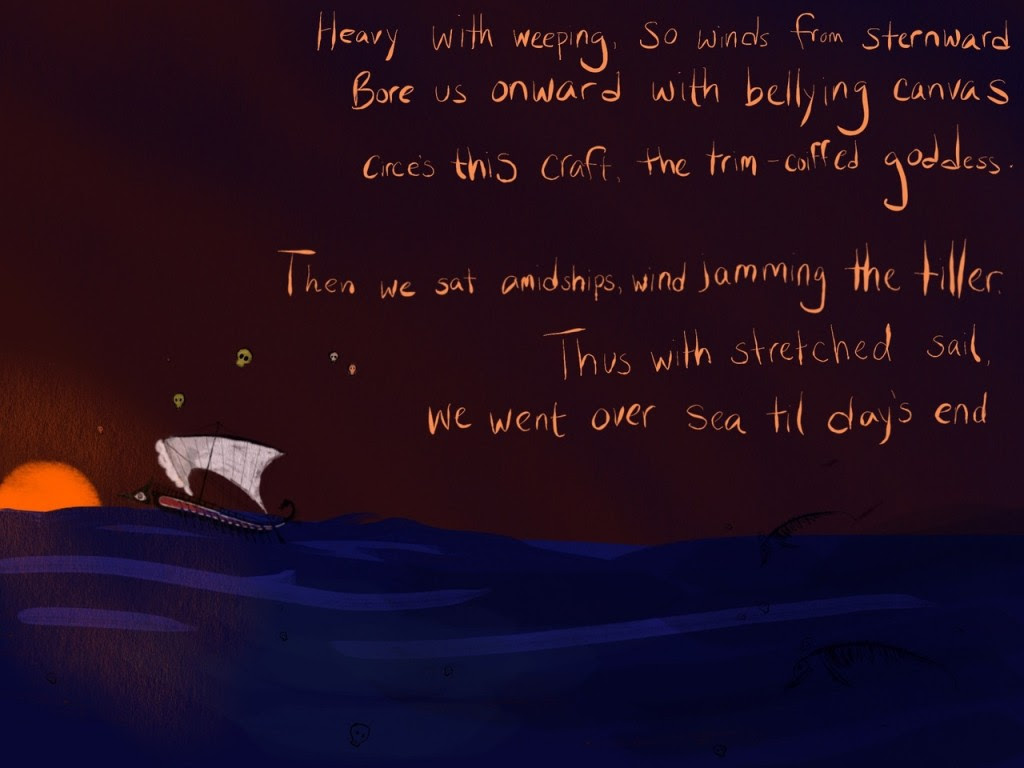




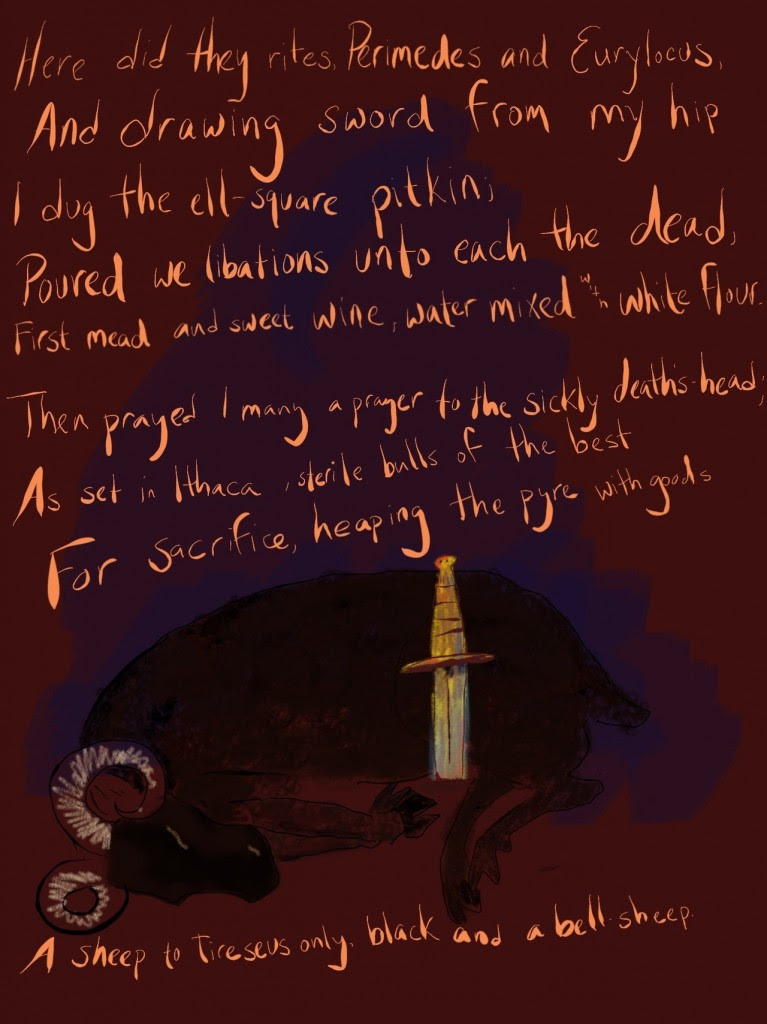

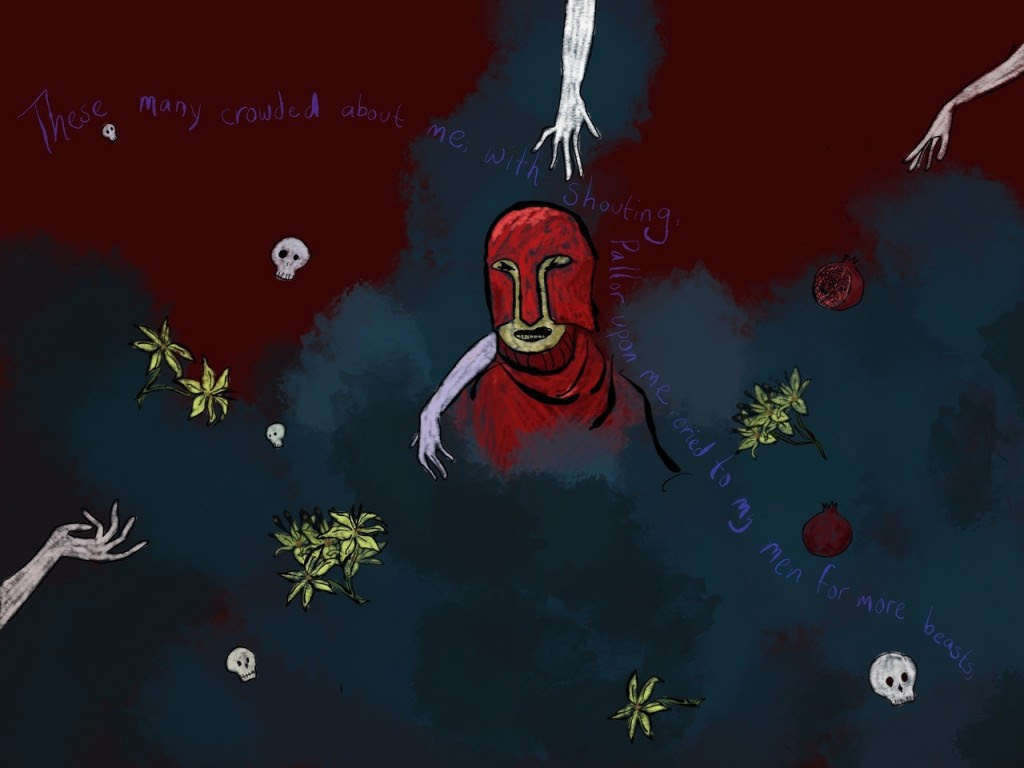
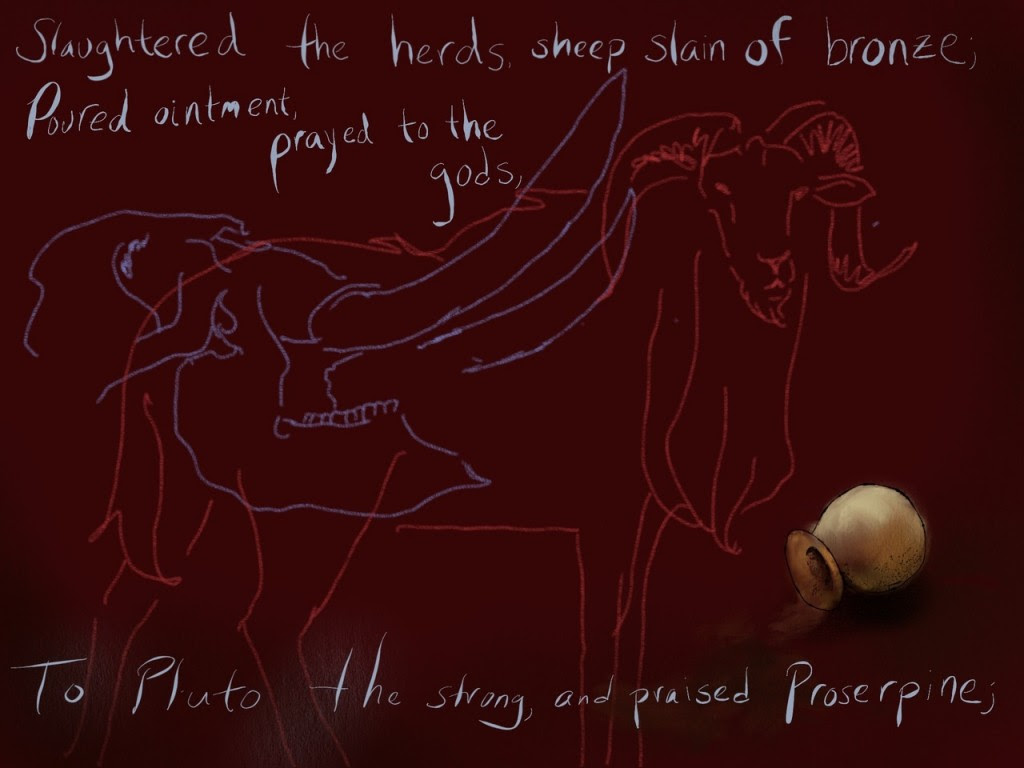
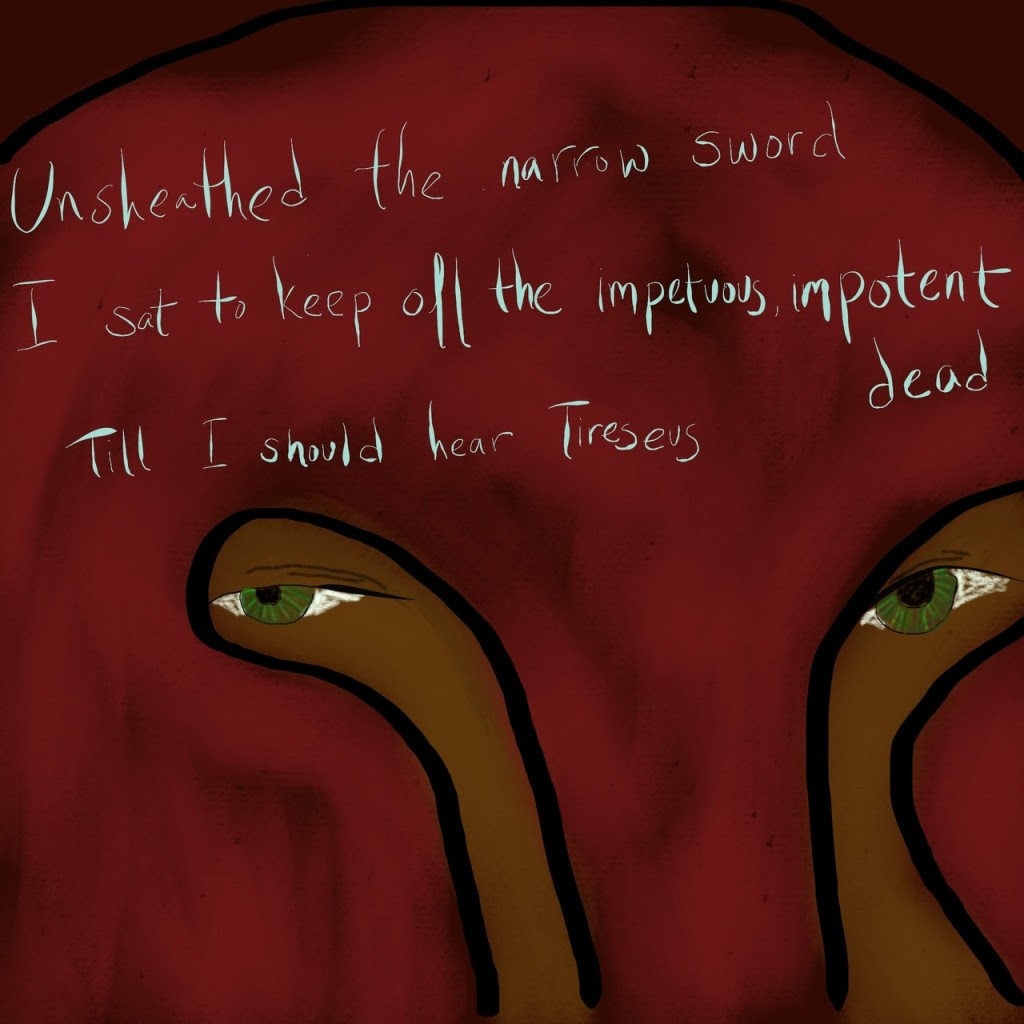

Ezra Pound: from Canto I (1915/1925) in A Draft of XXX Cantos (1930) Nora Sawyer Poetry Comics from Nora Sawyer, 2013-2014
Canto I
And then went down to the ship,
Set keel to breakers, forth on the godly seas, and
We set up mast and sail on that swart ship,
Bore sheep aboard her, and our bodies also
Heavy with weeping, and winds from sternward
Bore us out onward with bellying canvas,
Circe’s this craft, the trim-coifed goddess.
Then sat we amidships, wind jamming the tiller,
Thus with stretched sail, we went over sea till day’s end.
Sun to his slumber, shadows o’er all the ocean,
Came we then to the bounds of deepest water,
To the Kimmerian lands, and peopled cities
Covered with close-webbed mist, unpierced ever
With glitter of sun-rays
Nor with stars stretched, nor looking back from heaven
Swartest night stretched over wretched men there.
The ocean flowing backward, came we then to the place
Aforesaid by Circe.
Here did they rites, Perimedes and Eurylochus,
And drawing sword from my hip
I dug the ell-square pitkin;
Poured we libations unto each the dead,
First mead and then sweet wine, water mixed with white flour.
Then prayed I many a prayer to the sickly death’s-heads;
As set in Ithaca, sterile bulls of the best
For sacrifice, heaping the pyre with goods,
A sheep to Tiresias only, black and a bell-sheep.
Dark blood flowed in the fosse,
Souls out of Erebus, cadaverous dead, of brides
Of youths and of the old who had borne much;
Souls stained with recent tears, girls tender,
Men many, mauled with bronze lance heads,
Battle spoil, bearing yet dreory arms,
These many crowded about me; with shouting,
Pallor upon me, cried to my men for more beasts;
Slaughtered the herds, sheep slain of bronze;
Poured ointment, cried to the gods,
To Pluto the strong, and praised Proserpine;
Unsheathed the narrow sword,
I sat to keep off the impetuous impotent dead,
Till I should hear Tiresias.
But first Elpenor came, our friend Elpenor,
Unburied, cast on the wide earth,
Limbs that we left in the house of Circe,
Unwept, unwrapped in sepulchre, since toils urged other.
...Pitiful spirit...



9 comments:
Readers everywhere have been demanding, how can we continue one more day without comics -- that is, the brilliant, poetic sort of comics often featured here in the past, gifts of our wonderful friend Nora.
She first tackled the Cantos a few years ago, and as, yes, she has a life, and the job of illustrating an epic is very large, the work has been coming along in stages; installments to date are compiled in this excerpt.
More terrific Nora comics to come, stay tuned.
Meanwhile, batting around comically in what passes for the archives here, I've been trying to assemble a little list of the Nora funnies that have appeared to date.
Nora Sawyer Poetry Comics @BTP:
Thomas Wyatt: Thought-Wracked (A Poetry Comic by Nora Sawyer) 2/4/13
Robert Herrick: How Good Luck Arrives (A Poetry Comic by Nora Sawyer) 2/7/13
Edward Dorn's Blue Cowboy (A Poetry Comic by Nora Sawyer) 2/9/13
Mark Alexander Boyd: Sonet (A Poetry Comic by Nora Sawyer) 4/6/13
Christina Georgina Rossetti: Who has seen the wind? (A Poetry Comic by Nora Sawyer) 6/20/13
Robert Creeley: One Day (A Poetry Comic by Nora Sawyer) 4/1/13
Jack Kerouac: Three Haiku (A Poetry Comic by Nora Sawyer) 2/26/13
Herman Melville's The Tuft of Kelp (A Poetry Comic by Nora Sawyer) 3/11/13
Emily Jane Brontë: "All hushed and still within the house" (A Poetry Comic by Nora Sawyer) 3/19/13
W.B. Yeats: The Lake Isle of Innisfree (A Poetry Comic by Nora Sawyer) 9/3/13
e.e. cummings: [In Just-] (A Poetry Comic by Nora Sawyer) 4/14/13
Tom,
Thank you for Nora Sawyer Canto I post. I've seen her poetry comics on your blog before and liked them but this one just felt thrilling. I plan to use it with the aspiring English teachers I work with. Throw out the Common Core, pick up the Cantos (and Nora S.)!
-David
David,
Nora is that quite unusual species, a classicist who lives on a boat. When she was my student, her sight-reading of Latin embarrassed me (but then that gets easier and easier these days, and not just with the Latin). Her abundant gifts to this blog have never ceased to wow us -- that less talented cartoonist with the Charles Schultz knockoff moniker couldn't hold a candle.
OMG, I know I've left some Nora funnies off that list, but forgetting this one -- unforgiveable. She knocks it out of the park.
Tom Clark's Baseball and Classicism (A Poetry Comic by Nora Sawyer)
Oh Tom, this is such a lovely surprise! I'll have to finish this Canto illustration soon -- for some reason poor Elpenor proved un-illustratable last time I tried. But you've definitely put some more wind in my sails. (Like Odysseus, I sometimes need a good kick in the pants).
Tom,
Nora Sawyer has "set up mast and sail on [Pound's] swart ship,/ Bore sheep aboard her. . ." ---- leaves us breathless, remembering those "Limbs we left in the house of Circe. . ." what a vision of such words!
On Nora's behalf, thanks very much Steve. A scholar of poetics recognizing the degree of difficulty and the quality of achievement -- this is real.
Now that it has been declared by the media that we currently stand at the brink of, and in some precincts have already plunged into, a grand clash of civilizations, it's perhaps timely to follow Pound's pursuit into the archaic underworlds of the Nekuia, most ancient part of the Odyssey -- origins, in the modern poet's mind, of Western civilization. In the eleventh book of the Homeric epic, Odysseus sails away from the isle of Circe, destined for the domain of the dead, where, he hopes, he will learn from the blind Theban prophet Tiresias how to get back home to Ithaca. In the course of this dark voyage he involves himself in ritual that represents a further descent into a prehistorical realm, encounters the vapourish spirits of the dead, and acquires knowledge. Pound chose to base his version of the story on an obscure Renaissance Latin translation, and to write in an alliterative accentual verse which he had also employed in his translation of The Seafarer, an English text of comparable antiquity, as he thought. His transformation of the Homeric Nekuia is a linguistic tour de force which does indeed mark the end of something, at the moment when Europe was engulfed in the darkness of a war from which many men Pound knew would never return.
There have been countless handsome illustrated editions of the Homeric poem, I've seen and admired many of them, and to speak truly, I've not yet seen one that manages to capture the reach of imagination we are offered in Nora's illustrations, which, in a real and deep sense, respond to the Poundian challenge to Make It New.
Talking of which -- Nora -- "(Like Odysseus, I sometimes need a good kick in the pants)" -- gave me the first wrinkle of a smile all day. When Odysseus is shipwrecked, he is saved from the high seas by clinging to a scrap of cloth conveniently lent him by the divine Leuconoe, who has, in Pound's iterated allusions to the episode in the Cantos, lent him her bikini, generous girl of every lost seafarer's dreams.
Things were better during that murky civilizational transition epoch, methinks. Which goddess will miraculously arrive in the morning to haul the broken refrigerator down the broken steps of the last outpost of the lameduck civilization of the collapsing haunted house?
"...set up mast and sail..."
Ezra Pound reads Canto 1 (film by F.W. Murnau)
Thanks, Stephen and David! And thank you, Tom, for the link to the video and for the insight into Pound's epic journey. Not taking your Pound class at New College is still one of my big regrets.
Post a Comment